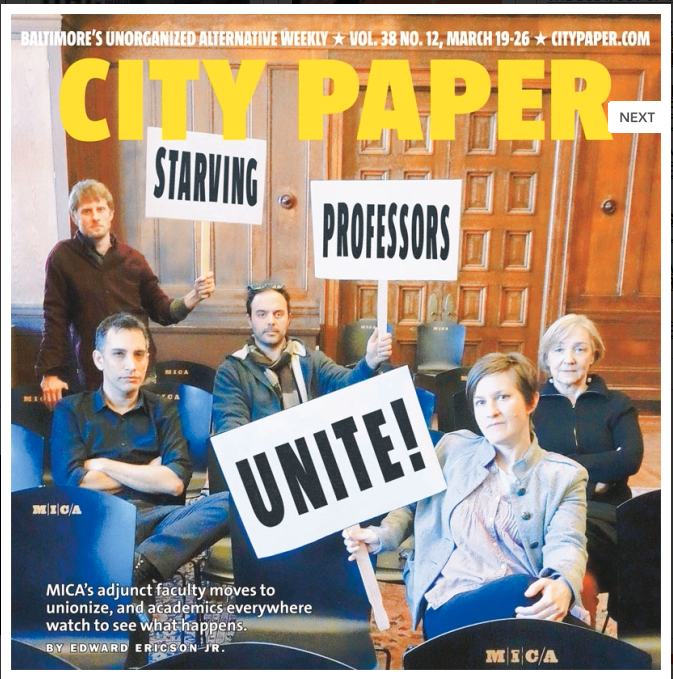This week’s cover of the Baltimore City Paper becomes questionable when you learn that the five MICA adjuncts representing unionization efforts were asked to hold blank signs – and that CP editors arbitrarily filled in the words “Starving Professors Unite” without telling the subjects what they planned to do. This journalistic approach is manipulative and out of character with City Paper’s usual high standards. To anyone familiar with such professors, it is obvious that any signs that they would have written themselves would have been much more accurate and more poetic. Blank signs would have also better represented the vulnerability and visibility of these five courageous individuals (Joshua Wade Smith, Katherine Kavanaugh, Leslie Shellow, Dominic Terlizzi, and Ismael Carillo), who agreed to openly represent the needs of their colleagues.
On the whole, this article presents two complex and differing sides of the issue of unionization for adjunct professors, after MICA adjuncts successfully filed for union election to join the Service Employees International Union (SEIU) Local 500 Coalition of Academic Labor on March 7, 2014. This union has been working with adjunct professors across the country, recently in Washington, DC and in Boston. Because of federal labor laws, all of MICA’s adjunct professors will have the opportunity to vote for or against union membership within a month of filing. Ballots will be anonymous. Both the part time faculty committee who filed and President Fred Lazarus have encouraged all adjuncts to vote.
On the whole, the article seems most sympathetic to MICA’s adjuncts, who come off as hardworking and dedicated professors who simply need better working conditions to succeed and survive. There are a number of graphs and charts comparing adjunct professor’s salaries over the years, showing that they have barely increased in decades, and the article also compares MICA’s top administrator’s salaries with those of part time professors and the disparities are pretty astounding.
One additional point the article makes is that MICA currently pays their adjuncts slightly more than most other area institutions – around $4,000 a class, with a maximum of $5,000 after they have taught at the college for many years. However, CP author Edward Ericson Jr is incorrect in his assumption that, “If they can wrangle four classes per semester, theoretically they might pull down $40,000 per year and still have the summer free.” MICA currently limits the number of courses an adjunct can teach per year to four, unless you have a provisional contract. This means that experienced adjunct professors teaching the maximum at MICA can make up to $20,000 a year and must take on additional jobs at other institutions to make a living wage.
In an email sent out to the MICA community on March 19, President Fred Lazarus said the issue of unionization for adjuncts is “the most important governance decision that will be made at MICA in my 35 year tenure and will influence the future of the College and its culture for decades to come.” He also said that a month is not enough time to make such an important decision, especially since this time is “already the busiest of the year and one of great transition.” While a logical suggestion, it was noted in the article that the professors had convened regular meetings with the President and top administrators for the past two to three years.
Of course there are two sides (usually many sides) to every issue and all deserve to voice their concerns and be heard in a respectful manner. However, I don’t think anyone wants to appear to be on the ‘wrong side’ of history. If you look at every progressive movement, from civil rights to gay marriage to decriminalization of drugs, there are always individuals in places of power saying, “We hear you, but the timing’s not right” when it is obvious that the time is now. In looking back, it is often taken for granted that progressive movements eventually prevail.
Right now there is a problem – an adjunct crisis in America creating an underclass of impoverished PhD’s and MFA’s. Maybe these people don’t have much “market value” according to corporate America, but collectively they have a chance to present their view in a way that guarantees it will be heard. A union is one solution to this problem that immediately grants the right to collectively bargain for fair wages and treatment for adjunct professors.
MICA is a unique institution and Baltimore is different from other cities. If you would like to suggest an innovative, local solution or side to this issue, Bmoreart is happy to host a public discussion. I would also like to reach out to the DC colleges and universities who have successfully implemented unions for part-time professors – Georgetown, American University, and George Washington University – to discuss the outcome. From what I have been told from personal discussions with employees of these schools, increases in pay, as well as publicly defined structures for job security, have allowed adjuncts to teach their students more effectively and with an improved quality of life.
Bottom line, education is supposed to be about students and learning, with teachers giving their best, providing quality experiences and acting as mentors. If those hired to teach students are overworked, underpaid, and chronically stressed out, how can they teach to the best of their abilities? It is in the best interest of institutions of higher learning to find a solution to the problem, but national trends show that colleges are not motivated to address the issue until pressured. If unions do not supply this pressure through collective representation for those with little power, how will these much needed reforms come about? Please post your comments here.
* Author Cara Ober is the Founding Editor at Bmoreart. She has also been an adjunct professor at MICA since 2005. This op-ed reflects Ober’s personal opinions and not necessarily those of Bmoreart and its other contributors.
** The cover photo for the March 19, 2014 Baltimore City Paper is by Jim Lucio. (Not sure who is responsible for the photoshopping.)






